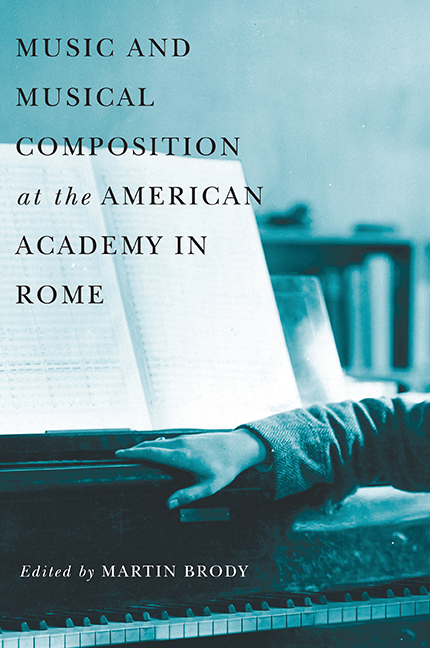Book contents
- Frontmatter
- Contents
- List of Illustrations
- Introduction
- Part One A History of the Rome Prize
- Part Two Origins, Ideology, Patronage
- Part Three Two Case Studies in Internationalism
- 5 Forging an International Alliance: Leo Sowerby, Elizabeth Sprague Coolidge, and the Impact of a Rome Prize
- 6 Class of ’54: Friendship and Ideology at the American Academy in Rome
- Part Four Primary Sources
- Appendix: Composers at the American Academy in Rome, 1921–40
- Selected Bibliography
- List of Contributors
- Index
5 - Forging an International Alliance: Leo Sowerby, Elizabeth Sprague Coolidge, and the Impact of a Rome Prize
from Part Three - Two Case Studies in Internationalism
Published online by Cambridge University Press: 25 October 2017
- Frontmatter
- Contents
- List of Illustrations
- Introduction
- Part One A History of the Rome Prize
- Part Two Origins, Ideology, Patronage
- Part Three Two Case Studies in Internationalism
- 5 Forging an International Alliance: Leo Sowerby, Elizabeth Sprague Coolidge, and the Impact of a Rome Prize
- 6 Class of ’54: Friendship and Ideology at the American Academy in Rome
- Part Four Primary Sources
- Appendix: Composers at the American Academy in Rome, 1921–40
- Selected Bibliography
- List of Contributors
- Index
Summary
Educated in Chicago, the composer Leo Sowerby became the first composer fellow at the American Academy in Rome in 1921 at the age of twenty-six. His solid supporter as he traveled from the shores of Lake Michigan to the Janiculum Hill was the Chicago patron Elizabeth Sprague Coolidge. Zooming in on the professional relationship of this composer and patron reveals much about the networks of financial assistance, aesthetic affi nity, and geographic origin that launched the music program at AAR, offering details about how that support affected one particular artistic career. Sowerby's story dominates, but Coolidge repeatedly enters the narrative, initially in Chicago, where both had ties to the Chicago Symphony and to the city's thriving culture of classical music. Before Sowerby headed to Rome, Coolidge programmed his music at her newly formed Berkshire Festival in Massachusetts, and after he had the prize in hand, she continued to connect with him in Italy. Coolidge's loyalty to Sowerby exemplifi es how conservative aesthetics joined hands with American wealth and how high-powered transnational alliances could change individual lives. For Sowerby, the Rome fellowship broadened his world exponentially, giving him exposure to composers in Italy and providing an opportunity to travel throughout Europe. No son of privilege, he was well aware of the exceptional prospects that suddenly opened up for him. For Coolidge, supporting this rising musician meant she could champion a hometown boy. At the same time, doing so fit into her overarching mission to shape a meaningful role for herself in a burgeoning transatlantic cultural trade.
No full biography of Sowerby exists, nor does a comprehensive work list. As a result, this case study draws on a variety of primary sources. Sowerby's letters to Coolidge have been preserved in the Music Division of the Library of Congress, providing a valuable account of his youthful impressions. He confessed his dreams to her, writing as if to a mentor more than to a financial underwriter. Yet the differences in their age and status were clear, with the letters consistently addressed to “Dear Mrs. Coolidge” and signed “Leo.” Sowerby's ascent as a composer is further revealed in the society and arts pages of the Chicago Tribune, and the annual reports of the Academy's music program chronicle his activities as a fellow.
- Type
- Chapter
- Information
- Music and Musical Composition at the American Academy in Rome , pp. 195 - 221Publisher: Boydell & BrewerPrint publication year: 2014

